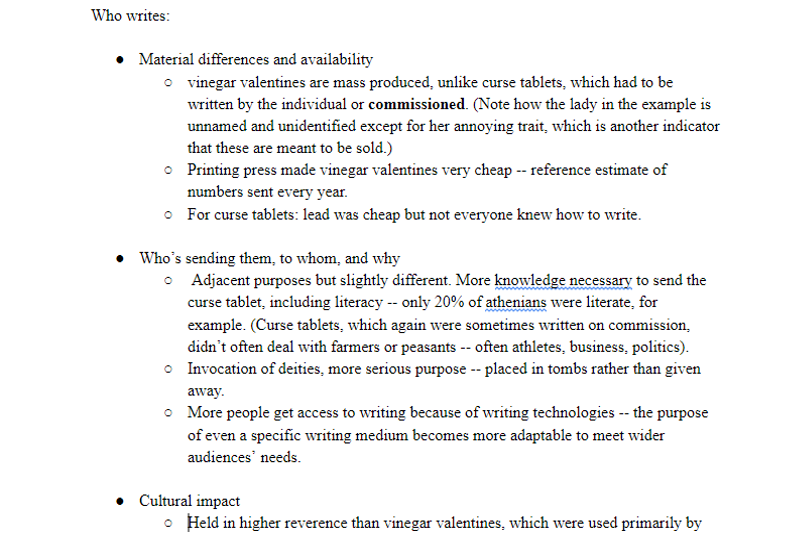Author: Adrianna Waters
As scholars and writers, sharing your work with others is one of the best ways to improve your writing and build connections. While it might be intimidating to submit your writing or research, you can gain valuable experience that will build your résumé and portfolio. There are many opportunities to submit your work for contests, conferences, or journals, but here are a few avenues within WKU.
The Ashen Egg
What it is: The Ashen Egg is WKU’s undergraduate journal on literature, rhetoric, linguistics, film, and popular culture.
When you can submit: Submissions are typically due at the end of the fall semester with acceptances and publications in the spring semester.
Advice: “My advice is… Find a sponsor who is passionate about your work. They will invest the time and energy into improving your writing through the beginning editing process. The sponsor builds the writer. My publications had sponsors who really really valued my work.”
- Sarah Lyons had work published in The Ashen Egg’s 2020 with her essay “The Political Gun Debate: Targeting Presuppositions in Contrasting Political Cartoons.” She was also accepted into The Ashen Egg 2021 (publication forthcoming).
Find out more here.
Undergraduate Conference on Literature, Language, and Culture
What it is: The Undergraduate Conference on Literature, Language, and Culture is an annual event sponsored by the English Department in which students have the opportunity to present their work to peers and faculty.
When you can submit: The conference takes place in the fall semester with submission deadlines usually at the end of October or beginning of November.
Advice: “Presenting at a conference is a great way to develop academically, and the Undergraduate Conference allows you to enter these experiences in a familiar environment. You should not be afraid of submitting to the conference because the English Department is very kind and excited to hear your papers. The professors and other students engage with your paper and encourage you in your work. You may be asked a question that prompts more research to further develop the paper, or you may be inspired to begin new projects.
To prepare for the Undergraduate Conference, I read my paper aloud and noted language that sounded awkward or confusing. Sentence structures that work in writing may not be effective verbally. I recommend adjusting this language and practicing the presentation until you feel that the paper flows smoothly in speech.”
- Joseph Shoulders presented “The Gender Identity Defined by a name in Silence” at the 2020 Undergraduate Conference on Literature, Language, and Culture.
Find out more here.
Mary Ellen and Jim Wayne Miller Celebration of Writing
What it is: The Mary Ellen and Jim Wayne Miller Celebration of Writing contest is open to English majors or minors. The contest’s genre rotates every year with past genres including poetry, fiction, and creative nonfiction. Each year, WKU welcomes a guest writer to judge the finalists and choose three winners. Finalists have the opportunity to attend a workshop with the guest writer and receive feedback.
When you can submit: The contest is in the fall semester with the deadline in September/October and the ceremony in October.
Advice: “[The contest] was an excellent experience, especially the workshop where I got to read my poem to the guest poet and other finalists and hear their thoughts and ideas about my poem. It helped me see my writing in different ways, and really inspired some of my later edits, which I think is incredibly important for any writer.
However, this was not my first time submitting to the Mary Ellen and Jim Wayne Miller Celebration of Writing, which bridges onto my advice for students interested in submitting. I have submitted every year that I have been at WKU, the fall of 2018, 2019, and then 2020, but it was not until my third submission that I was accepted as a finalist. I know that oftentimes submitting a piece of work can be daunting at best, especially if you are not sure what is going to happen to it, or you get discouraged by rejection. I almost didn’t submit this past fall. I was thinking about it, but I kept talking down to myself, saying that I didn’t have anything good enough or that I thought was interesting, even though I had completed “I Have My Mother’s Handwriting” soon after the opening for submissions was announced. It wasn’t until the day that submissions were due that I was looking at the document again and finally told myself to submit it, that the worst thing that can happen is nothing, and I’ve already been there.
That is the best advice that I can give to anyone interested in submitting to the Mary Ellen and Jim Wayne Miller Celebration of Writing: that the worst thing that can happen is nothing. If you have a piece of writing that you have completed, you should submit it, even if you aren’t sure, or think that it may not be good. After all, the process to submit is physically a lot easier than what it takes to write.”
- Eli Edens was a finalist and received 2nd place in the 2020 Mary Ellen and Jim Wayne Miller Celebration of Writing contest for their poem “I Have My Mother’s Handwriting.”
Find out more here.
Goldenrod Poetry Festival
What it is: The Goldenrod Poetry Festival is an annual event sponsored by the English Club. All majors can submit their poetry. There are ten finalists and three winners, and a visiting poet hosts a workshop for all ten finalists.
When you can submit: Goldenrod occurs in the spring semester, and submissions are typically due in March with the workshop/award ceremony in April.
Advice: “I would say 1. to send your work to an English professor unrelated to the competition in order to get a good proofread and conceptual editing, and 2. to wait! until the deadline gets a little closer–not last minute, but closer–before submitting. Don’t submit a month early–it is pompous to think that one may not develop edits or new pieces that are better than what one has right now. And also 3. write more–gives you more from which to choose.”
- Ella Corder received 2nd place in Goldenrod in the spring of 2020 for her poem “A Sudden Sinking Feeling in the Bathroom at a Goth-Prom House Party.”
Find out more here.
Zephyrus
What it is: The Zephyrus is WKU’s fine arts literary magazine which publishes art, poetry, short stories, and creative nonfiction.
When you can submit: The Zephyrus opens submissions in the spring semester. Submissions are typically due by the end of February, and the Zephyrus publishes by the end of the spring semester.
Advice: “’’Don’t overthink it’ would be my best advice. Especially with Zephyrus, where our peers are the editors, there’s no reason to feel intimidated or afraid of submitting work. I have a bad habit of not submitting my best stuff in fear of it being rejected, because then you think “now what?” if it’s your best and it’s turned down. But you never know if it’s good enough to submit until you submit it. And even then, a rejection is just an invitation to review and revise your work. So, send out what you write, specifically to Zephyrus, and see what happens—it’ll be okay no matter what.”
- Noah Powers’ poems “God Speaks in Blues,” “In a car park off Broadway,” and “Rising with the Sun” and his essay “Ruminations at the Grand Canyon” were published in the spring 2020 Zephyrus. “Ruminations at the Grand Canyon” also won the Wanda Gatlin Essay Award for that issue.
Find out more here.
Student Research Conference
What it is: The Student Research Conference is an annual event for all WKU undergraduate or graduate students to share their work through presentations, performances, posters, exhibits, etc.
When you can submit: The Student Research Conference occurs in the spring semester. Abstracts are usually due by the beginning of March, and the conference takes place in April.
Advice: “When writing your abstract, make sure that it is concise and coherent. While your research is likely thorough and complex, your abstract should be easy for readers to comprehend so that they can quickly get an overview of your work. Also, there are lots of resources to help you, so be sure to use them!”
- Fallon Russell was accepted to present at the 2021 Student Research Conference for her augmentation project titled “Typographic Tone in Texting.” Her project analyzes how tone is communicated in text messages through punctuation, capitalization, and special character patterns
Find out more here.
Kentucky Honors Roundtable
What it is: The Kentucky Honors Roundtable is similar to the Student Research Conference; however, KHR is open only to Honors students and coordinates with other Kentucky Honors programs. Although any research can be presented, several Honors students present their CE/T work at KHR.
When you can submit: The Kentucky Honors Roundtable has occurred in both the fall and spring semesters. In the fall semester, the deadline is usually in early September with the conference in late September; in the spring semester, the deadline is usually in early February with the conference in late February. Honors sends out emails with confirmation dates for KHR at the beginning of each semester.
Advice: “When creating your abstract and preparing your presentation, reach out to a faculty member or advisor for help! If you’re submitting your CE/T project for the conference, you already have two resources in your first and second readers who are more than happy to help you prepare.”
- Adrianna Waters presented a portion of her Honors CE/T “Emmie and the Enchanted Orchid: Portraying Positive Disability Representation in Children’s Media” at the spring 2021 Kentucky Honors Roundtable.
Find out more here.
Gender & Women’s Studies Creative Writing Contest
What it is: The Gender & Women’s Studies Creative Writing Contest is an annual event in which students can submit poetry, fiction, or creative nonfiction of up to 750 words exploring feminist themes or issues. There are separate sections and winners for undergraduate and graduate students.
When you can submit: The Gender & Women’s Studies Creative Writing Contest takes place in the spring semester with the deadline typically in March.
Advice:
“This contest is a great time for anyone interested in sharing their work, especially those with work preoccupied with gendered experience and study. I would advise anyone thinking about submitting to prepare work well in advance– submit what you’re comfortable with– and don’t be afraid to write about vulnerable or tricky topics. My piece was about my own personal experiences with abortion, and putting a very personal piece of my human experience into a speaker’s viewpoint of the world made the experience all the more enlightening. Have fun and don’t be afraid to express yourself.”
- Abigail Raley received third place in the 2020 Gender & Women’s Studies Writing Contest for her piece “The Kids Table.”
Find out more here.
There are several more opportunities to submit and/or present your work for conferences, contests, journals, etc. For a list of WKU and non-WKU opportunities, check out this guide for undergraduate students and graduate students.
Be sure to keep an eye out for emails or announcements from your professors for new writing opportunities!




















